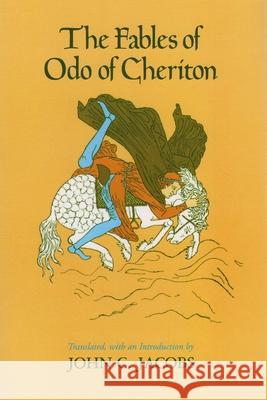Fables of Odo of Cheriton » książka
Fables of Odo of Cheriton
ISBN-13: 9780815623267 / Angielski / Miękka / 1985 / 216 str.
This is one of the first complete collections of medieval Latin fables to appear in modern English. Odo of Cheriton (c. 1185- c. 1247) wrote sophisticated fables, filled with great wit and humor, yet highly moral, even didactic, in keeping with the age in which he lived - one vigorous in religious, philosophic, scientific, and social debate and conflict. Jacobs' translation of the 117 fables makes them available to a new readership at a time when interest in fables, parables, and fairy tales is growing. In addition to the fables themselves, Jacobs has provided a substantial Introduction which discusses Odo of Cheriton's life and his 13th-century world. As the first comprehensive discussion of Odo's career and critical analysis of the fables, the Introduction will interest medievalists and a broad range of readers. Drawing upon modern critical techniques, Jacobs sheds new light on medieval narrative and modes of interpretation. He also shows how the moralizing commentaries attached to representative fables are integral to the fables' narrative art. The text is illustrated with seventeen exceptional sketches taken from the album of Villard de Honnecourt - a near contemporary of Odo. These drawings have a fluid vitality which perfectly complements the delightful narratives.
This is one of the first complete collections of medieval Latin fables to appear in modern English. Odo of Cheriton (c. 1185- c. 1247) wrote sophisticated fables, filled with great wit and humor, yet highly moral, even didactic, in keeping with the age in which he lived – one vigorous in religious, philosophic, scientific, and social debate and conflict.Jacobs’ translation of the 117 fables makes them available to a new readership at a time when interest in fables, parables, and fairy tales is growing.In addition to the fables themselves, Jacobs has provided a substantial Introduction which discusses Odo of Cheriton’s life and his 13th-century world. As the first comprehensive discussion of Odo’s career and critical analysis of the fables, the Introduction will interest medievalists and a broad range of readers.Drawing upon modern critical techniques, Jacobs sheds new light on medieval narrative and modes of interpretation. He also shows how the moralizing commentaries attached to representative fables are integral to the fables’ narrative art.The text is illustrated with seventeen exceptional sketches taken from the album of Villard de Honnecourt – a near contemporary of Odo. These drawings have a fluid vitality which perfectly complements the delightful narratives.











